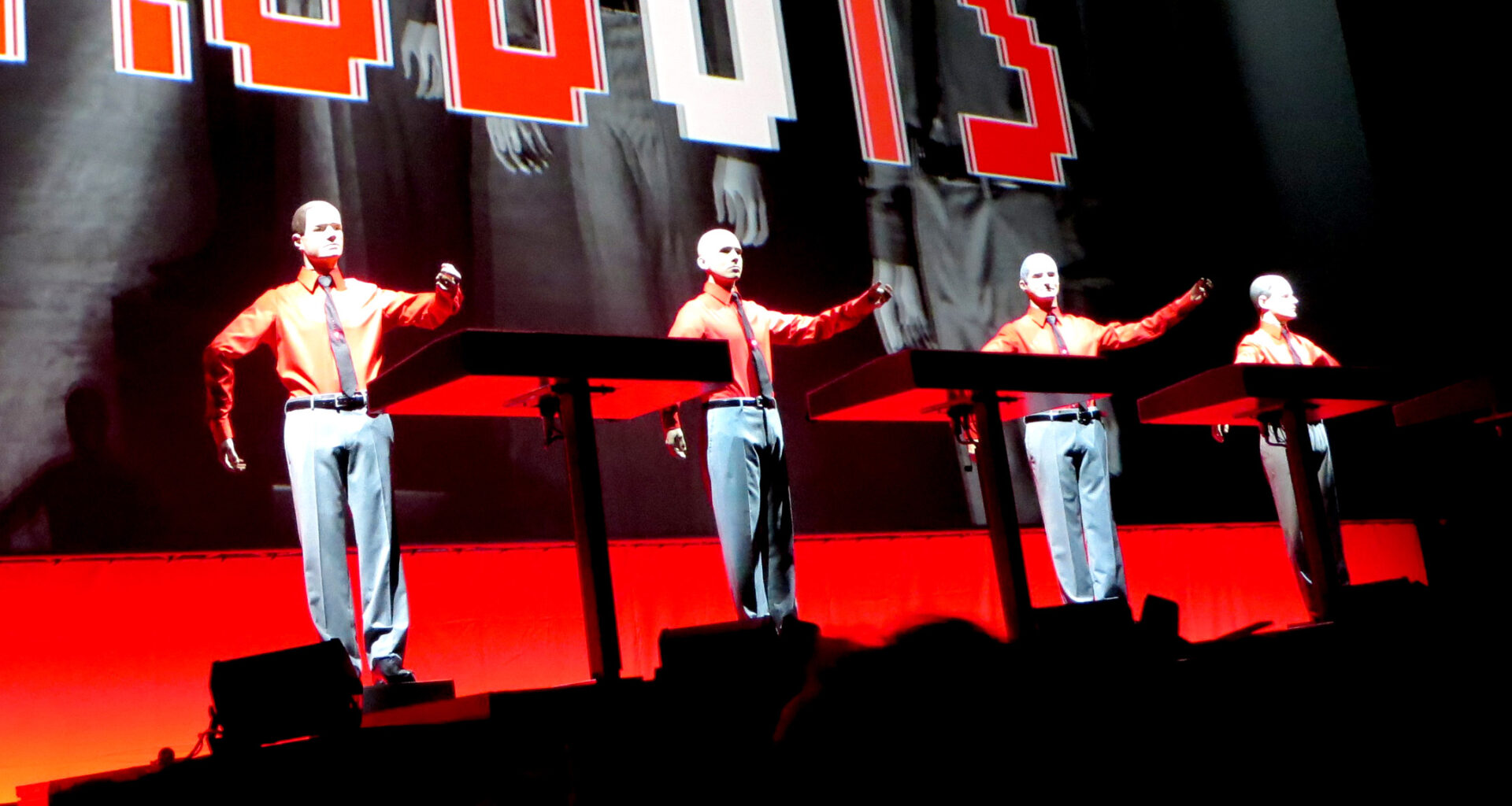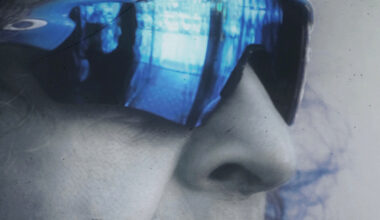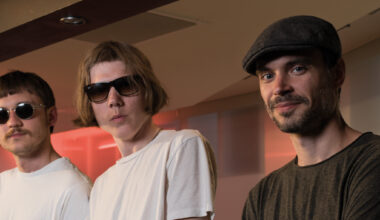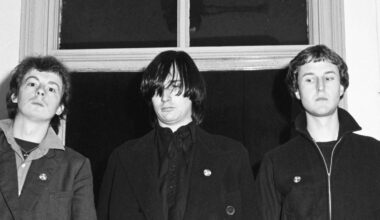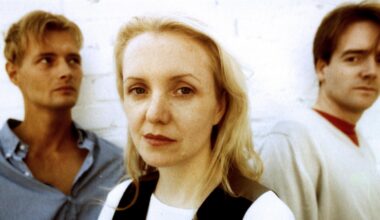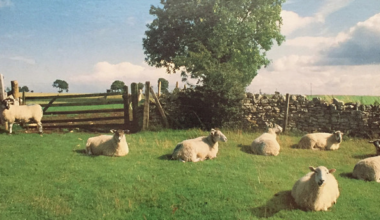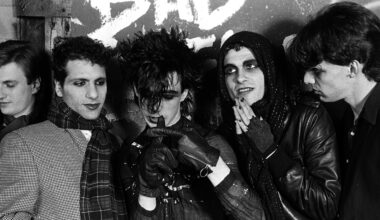Last month, Kraftwerk played ‘Tour De France’ live at the opening stage of the world’s most famous cycle race – the first time they’ve done so in the 30 years since the track was recorded. As their legion of fans find themselves asking about almost everything the band do, “What took them so flipping long?”
As a concept, Kraftwerk performing their ‘Tour De France Soundtracks’ album in its entirety at the opening stage of the Tour de France itself sounds so mind-bogglingly obvious you wonder why it’s taken them so long to do it.
Ralf Hütter and his associates played Manchester’s Velodrome back in 2009, but amazingly this is the first time that Kraftwerk have made an official live appearance at the world’s premier pro cycling event. Tonight, they will perform one of their 3-D audio-visual extravaganzas as part of the Tour’s Grand Départ celebrations at Utrecht’s Tivoli Vredenburg, the Dutch city’s new, five-storied, angular wedge of a concert hall. The only thing that could make it more conceptually perfect was if they’d managed to get the race to start on their home turf of Düsseldorf instead of here in the Netherlands.
Like most things in Kraftwerk lore, the three-decade journey to get here has been as arduous as the climb up Mont Ventoux. The song ‘Tour De France’, which was originally intended for inclusion on the abandoned ‘Techno Pop’ album, has long served as an unofficial jingle to the famous cycle race. It pays a serene tribute to the event’s legendary highs and lows – enduring a flat tyre, regrouping with your peloton mates, finishing on the Champs-Élysées – and marked something of a departure from the group’s previous harder edged work, with its funky slap-bass and dreamy vibraphone scales, augmented by sampling the percussive rasp of Florian Schneider’s bike chain.
Some 20 years later, in 2003, in another of the band’s bewilderingly protracted manoeuvres, the ‘Tour De France Soundtracks’ album was released to celebrate the 100th anniversary of the Tour. Due to their extreme perfectionism, however, it didn’t reach the shelves until weeks after the race itself had wrapped.
As a record, ‘Tour De France Soundtracks’ is perhaps best approached as precisely that, a suitably hypnotic soundtrack to an intensive cycling workout rather than a compelling body of original material. When it was released, after a 17-year hiatus in the Kraftwerk catalogue, a measure of disappointment seemed inevitable. In the interim, the acid house revolution had happened and dance music had promptly exploded and splintered into hundreds of different sub-genres, many of which were quickly absorbed into the mainstream. As a result, ‘Tour De France Soundtracks’ sometimes sounds more like a diluted by-product of the band’s own inspiration than the original source from which so many burbling electro delights first sprung.
On the one hand, the title track is one of the most perfectly realised pop songs Kraftwerk ever produced (and their biggest UK hit since ‘The Model’, charting twice). On the other, it’s a precursor of things to come – Ralf Hütter and Florian Schneider’s mounting obsession with the saddle over the studio. According to Wolfgang Flür’s lively memoir, ‘I Was A Robot’, their passion for the sport over-rode their passion for music, slowing the creative momentum and causing an irredeemable rift in the group’s classic line-up.
Ralf and Florian took up serious cycling in 1978, but their obsession piqued after the ‘Computer World’ tour of 1981. The pair would take the night shift at their Kling Klang studio, abandoning it by day to embark on epic workouts, cycling up to 200km a day, and even jumping off the tour bus early so they could complete the journey to a venue by bike. Wolfgang Flür recalls them drooling over cycling equipment catalogues in the studio and recounts how they would commission specially tailored cycling suits. He says they treated bicycle tyres with the sort of reverence normally reserved for vintage wines, fussing over their precise storage conditions.

For Ralf, cycling and music are perfect bedfellows. “Cycling is like music,” he told The Guardian’s John Harris in 2009. “It is always forward. It is free, it is outside, it is the weather, it is the planet, it is energy. Cycling has parallels with certain aspects of music.” Even a major accident while crossing a dam on the Rhine in 1983 did little to dampen his ardour for the sport. Despite fracturing his skull and ending up in a coma, Ralf was keen to play down the impact: “It didn’t affect me,” he told Harris. “I got a new head and I’m fine… I just forgot my helmet and I was in hospital for three or four days.”
Ralf’s cycling regime is said to be a little calmer these days. He apparently still manages to clock up “a couple of thousand kilometres a year”, though.
It’s fair to say that Kraftwerk have coasted some in the last few decades, gliding downhill with their hands behind their heads. We have grown accustomed to glacial intervals between albums, but at least they have stepped up their performance profile in recent years, graduating from occasional festival appearances to full tours. For UK fans, this culminated in the frenzy that was their 2013 Tate Gallery residency playing Der Katalog, each of their eight classic studio albums presented in full, which sold out faster than a pumped up Lance Armstrong taking the downhill stretch of La Mongie.
On the broiling streets of Utrecht, however, there’s not much evidence of Kraftwerk mania, mainly because today the city is as obsessed with competitive cycling as Team Hütter is. Utrecht has been transformed for le Grand Départ – from a smaller, more serene version of nearby Amsterdam to something akin to Rio on the Canal.
There are thousands of cycling fans lining the race route, some getting stuck into boozy makeshift picnics, others scaling lamp posts, fences and poster towers for prime views. A caravan of vehicles bizarrely shaped like giant McCain oven chips and Vittel water bottles zip past at breakneck speeds, flinging out promotional merchandise and water cannoning the grateful crowd. Every shop in the city sports some sort of two-wheeled window display and even the dog statue in the Lepelenburg Park is wrapped in a yellow jersey.
Inside the Tivoli Vredenburg, of course, it’s a very different story. Hilde and Jan have travelled from Brussels, driving here straight after work. “I really hope they play ‘Autobahn’ tonight – all 26 minutes of it,” says Hilde. “I expect we’ll hear ‘Tour De France’ too,” adds Jan. “Well, there may be a small riot if we don’t!” Greg from Canada has been a fan since ‘The Man-Machine’, but he didn’t realise the Tour de France charabanc was in town until he arrived. I ask him why Kraftwerk and cycling seem so entwined. “I think it’s the ultimate synergy of man and machine moving forward in constant motion,” he replies.
There is no support act and the red curtain rises at 8pm sharp, revealing our robot rulers already in place behind their neon-trimmed consoles. There’s no time for even a cursory wave to the crowd as the speakers begin to belch out a repeated pattern of distorted, excitably escalated words – “eins, zwei, drei” – before that colossal beat bounces into play.
Choosing ‘Numbers’ to open tonight’s set demonstrates Ralf Hütter’s confidence in the Kraftwerk legacy. The screen visuals stick with a flickering stream of huge, calculator green, dot matrix numerals, but you can practically see the light bulb pinging over Afrika Bambaataa’s head at a South Bronx block party far, far away in both place and time. ‘Numbers’ segues effortlessly into a beefed up, dark and sinister incarnation of ‘Computer World’, with its prophesy of shadowy governmental and uber-corporations who “control the data memory”.
While it is hard to see exactly what the band are doing behind their identical consoles, their tunnel vision expressions speak volumes and there are a few moments when their improvisational roots – don’t forget that Ralf and Florian first met on an improvised music course at Düsseldorf ’s Conservatory – become evident in subtle ways. Ralf looks impressively trim, if not quite perfectly at ease in his black lycra ‘Tron’ bodysuit. At times, he seems to resemble an older version of Future Islands’ Samuel T Herring, furrowing his brow at the young whippersnapper’s more animated stage smarts. The rest of the group are decked out identically, of course. You don’t notice them much, but I think that’s the point.
Something that rarely gets explored in discussions of Kraftwerk’s music is the pervasive sense of melancholy many of their best tracks are steeped in. Where ‘Computer Love’ has always sounded sweet and optimistic on record, tonight it comes across as heartbreakingly lonely, especially since a seemingly rather vulnerable Ralf effectively serenades a young, handsome vision of himself on the video screen. This genuinely causes me to well up for a moment, not a reaction I ever envisaged having at a Kraftwerk gig.
I occasionally forget that this is a 3-D concert and abandon my glasses, keen to remove an unnecessary barrier between myself and the band. They feel surprisingly accessible in this well-designed venue. But there’s no doubt the 3-D elements enhance certain tracks, particularly ‘Autobahn’, which is animated by a charming stop-motion cardboard cut-out style visualisation, putting you behind the wheel of a cartoon vintage VW.

After ‘Autobahn’ comes the first big surprise of the evening. The 1990 reboot of ‘Radioactivity’ for ‘The Mix’ album saw the track undergo a drastic modernisation. Once a naïve bit of wordplay, it’s now inconceivable to hear it without the bellowing round of “Chernobyl, Harrisburg and Hiroshima” that prefaces it, tipping the song’s meaning into unambiguous environmentally conscious territory. By 2015, “Hiroshima” has been replaced by “Fukushima” and several verses tonight are dispatched in Japanese, complete with projections of the lyrics in Kanji.
Finally, a mere eight tracks in, we get to the ‘Tour De France Soundtracks’ set, starting with a sampling of the re-engineered ‘Tour De France’ suite. The vast majority of the robo-vocals emanate from the electronics tonight, but when Ralf takes to the mic himself to deliver the laboured rhythmic exhalations that punctuate ‘Tour De France’ itself, it’s a genuinely startling moment. This seems to foreshadow the quirky ‘Elektro Kardiogramm’, which comes a little later, with a cruel irony. Surely a man of Ralf’s age is all too familiar with this particular medical process, intense fitness regime notwithstanding.
‘Vitamin’, one of the more distinctive tracks from ‘Tour De France Soundtracks’, sounds like a worried Pacman ghost rattling about an abandoned washing machine factory and we’re treated to a vivid stream of images, as hundreds of multi-coloured tablets slowly cascade from the rafters. A sly nod to our straight-laced übermensch’s role in fostering house music and its attendant associations with pharmaceuticals, perhaps? ‘Chrono’ meanwhile chugs by with all the excitement of a wet weekend circling the Redditch ring road and ‘La Forme’ is a similarly punishing uphill slog, what with its sluggish iteration of cycling-related words ending in “-tion”. It’s certainly more expiration than inspiration.
It does serve to lay the track for one of the highlights of the evening, though. The arrival of ‘Space Lab’ from ‘The Man-Machine’ truly is one of those pure stardust moments of pristine, precision tooled magic. And as if hearing the delicate, simmering modulations and plaintive whistled melody were not enough, the screens show pictures of the Tivoli Vredenburg’s Connect Four-like circle clad exterior being eclipsed by a giant UFO.
Somehow I was expecting to hear the ‘Tour De France Soundtracks’ album in sequence, with maybe a smattering of crowd pleasers towards the end, but instead Ralf wisely elects to bookend this central part of the set with a bounty of perfect bound classics. By the time the irresistibly jaunty chords of ‘The Model’ spring to life, the previously circumspect audience spontaneously breaks into a rhythmic clap and sing-along. The band pedal through the fearsome beast that is ‘The Man-Machine’ before tunnelling into an urgent ‘Trans Europe Express’ and ‘Metal On Metal’, the brakes screeching to such a deafening halt that you half expect the nose cone of an ICE engine to rip through the backcloth and plough across the stage.
With no waiting for that tiresome audience ego stroke, the legendary Kraftwerk robots rise up for the encore. An opening sequence of alarms, doops and mechanical sproingles stutter to life to reveal the four Dusseldroids in position. They do their disarming balletic thing, arms aloft, imploring the audience to, well, do what exactly? Join their ranks and take them for a waltz around the auditorium? In fact, they move more than their human counterparts. I swear I see Ralf Robot nodding his head in time to the metronome march at one point.
Soon after, their masters regroup behind their terminals for a second encore, this time in green-lit bodysuits. Lady Gaga eat your meat-clad heart out! They revisit ‘Tour De France Soundtracks’ with ‘Aerodynamik’ snaking its way in. Despite its chic Francophonic chevrons, it still comes across like the functional strain of trade fair stand muzak that you might hear at Munich’s BMW Welt.
The night’s only new discovery for me is the interstellar exploration vehicle that is ‘Planet Of Visions’ from the ‘Minimum-Maximum’ live album. Part of me takes a mischievous thrill in mishearing the lyrics as “Detroit, Germany, we’re still the best” like some playful boast reminding their progeny who the Euro electro-daddies are, but the words are actually the more inclusive “Detroit, Germany, we’re so electric”. But let’s be honest here, the “newer” tracks are mere practice laps for the unstoppable juggernaut of closing behemoths – the triple whammy of ‘Boing Boom Tschak’, ‘Techno Pop’ and ‘Musique Non Stop’.
As the seismic girder blasts of the latter pummel their way to a conclusion, the band members exit the stage individually, each giving a modest bow, leaving Ralf Hütter to issue a simple “Goodnight, guten abend, geodenacht”. Save for that, there is no glimmer of audience interaction whatsoever, but somehow this makes sense. Anything more exuberant would feel as creepy as their robots turning sentient and chatting to fans in the post-gig crush.
While the closing triptych gets into its flow, the visuals turn to intricate wire-frame CGIs of the music workers communing with their consoles, faithfully mirroring the stage reality and that of the audience’s lives too no doubt, and Kraftwerk seem more prescient than ever. It may have taken over 30 years of time trials and endurance training, but tonight was a barnstorming breakaway to brag about.
